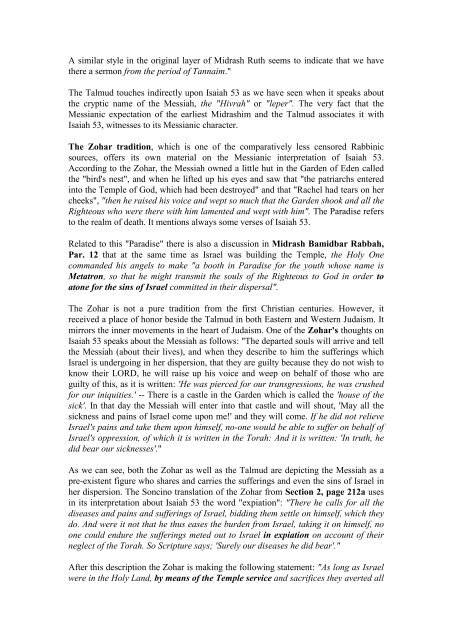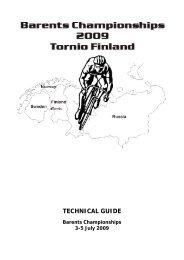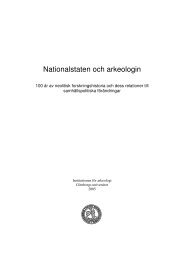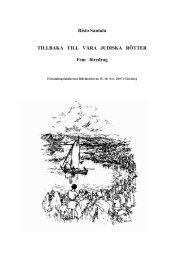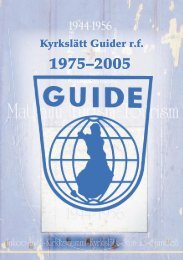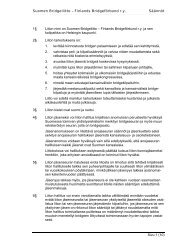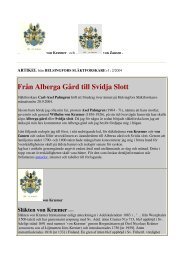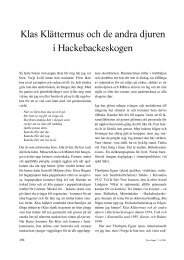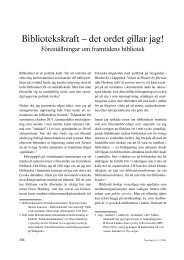PART II "Isaiah 53 and the despiced Messiah of his despiced people"
PART II "Isaiah 53 and the despiced Messiah of his despiced people"
PART II "Isaiah 53 and the despiced Messiah of his despiced people"
You also want an ePaper? Increase the reach of your titles
YUMPU automatically turns print PDFs into web optimized ePapers that Google loves.
A similar style in <strong>the</strong> original layer <strong>of</strong> Midrash Ruth seems to indicate that we have<strong>the</strong>re a sermon from <strong>the</strong> period <strong>of</strong> Tannaim."The Talmud touches indirectly upon <strong>Isaiah</strong> <strong>53</strong> as we have seen when it speaks about<strong>the</strong> cryptic name <strong>of</strong> <strong>the</strong> <strong>Messiah</strong>, <strong>the</strong> "Hivrah" or "leper". The very fact that <strong>the</strong>Messianic expectation <strong>of</strong> <strong>the</strong> earliest Midrashim <strong>and</strong> <strong>the</strong> Talmud associates it with<strong>Isaiah</strong> <strong>53</strong>, witnesses to its Messianic character.The Zohar tradition, which is one <strong>of</strong> <strong>the</strong> comparatively less censored Rabbinicsources, <strong>of</strong>fers its own material on <strong>the</strong> Messianic interpretation <strong>of</strong> <strong>Isaiah</strong> <strong>53</strong>.According to <strong>the</strong> Zohar, <strong>the</strong> <strong>Messiah</strong> owned a little hut in <strong>the</strong> Garden <strong>of</strong> Eden called<strong>the</strong> "bird's nest", <strong>and</strong> when he lifted up <strong>his</strong> eyes <strong>and</strong> saw that "<strong>the</strong> patriarchs enteredinto <strong>the</strong> Temple <strong>of</strong> God, which had been destroyed" <strong>and</strong> that "Rachel had tears on hercheeks", "<strong>the</strong>n he raised <strong>his</strong> voice <strong>and</strong> wept so much that <strong>the</strong> Garden shook <strong>and</strong> all <strong>the</strong>Righteous who were <strong>the</strong>re with him lamented <strong>and</strong> wept with him". The Paradise refersto <strong>the</strong> realm <strong>of</strong> death. It mentions always some verses <strong>of</strong> <strong>Isaiah</strong> <strong>53</strong>.Related to t<strong>his</strong> "Paradise" <strong>the</strong>re is also a discussion in Midrash Bamidbar Rabbah,Par. 12 that at <strong>the</strong> same time as Israel was building <strong>the</strong> Temple, <strong>the</strong> Holy Onecomm<strong>and</strong>ed <strong>his</strong> angels to make "a booth in Paradise for <strong>the</strong> youth whose name isMetatron, so that he might transmit <strong>the</strong> souls <strong>of</strong> <strong>the</strong> Righteous to God in order toatone for <strong>the</strong> sins <strong>of</strong> Israel committed in <strong>the</strong>ir dispersal".The Zohar is not a pure tradition from <strong>the</strong> first Christian centuries. However, itreceived a place <strong>of</strong> honor beside <strong>the</strong> Talmud in both Eastern <strong>and</strong> Western Judaism. Itmirrors <strong>the</strong> inner movements in <strong>the</strong> heart <strong>of</strong> Judaism. One <strong>of</strong> <strong>the</strong> Zohar's thoughts on<strong>Isaiah</strong> <strong>53</strong> speaks about <strong>the</strong> <strong>Messiah</strong> as follows: "The departed souls will arrive <strong>and</strong> tell<strong>the</strong> <strong>Messiah</strong> (about <strong>the</strong>ir lives), <strong>and</strong> when <strong>the</strong>y describe to him <strong>the</strong> sufferings whichIsrael is undergoing in her dispersion, that <strong>the</strong>y are guilty because <strong>the</strong>y do not wish toknow <strong>the</strong>ir LORD, he will raise up <strong>his</strong> voice <strong>and</strong> weep on behalf <strong>of</strong> those who areguilty <strong>of</strong> t<strong>his</strong>, as it is written: 'He was pierced for our transgressions, he was crushedfor our iniquities.' -- There is a castle in <strong>the</strong> Garden which is called <strong>the</strong> 'house <strong>of</strong> <strong>the</strong>sick'. In that day <strong>the</strong> <strong>Messiah</strong> will enter into that castle <strong>and</strong> will shout, 'May all <strong>the</strong>sickness <strong>and</strong> pains <strong>of</strong> Israel come upon me!' <strong>and</strong> <strong>the</strong>y will come. If he did not relieveIsrael's pains <strong>and</strong> take <strong>the</strong>m upon himself, no-one would be able to suffer on behalf <strong>of</strong>Israel's oppression, <strong>of</strong> which it is written in <strong>the</strong> Torah: And it is written: 'In truth, hedid bear our sicknesses'."As we can see, both <strong>the</strong> Zohar as well as <strong>the</strong> Talmud are depicting <strong>the</strong> <strong>Messiah</strong> as apre-existent figure who shares <strong>and</strong> carries <strong>the</strong> sufferings <strong>and</strong> even <strong>the</strong> sins <strong>of</strong> Israel inher dispersion. The Soncino translation <strong>of</strong> <strong>the</strong> Zohar from Section 2, page 212a usesin its interpretation about <strong>Isaiah</strong> <strong>53</strong> <strong>the</strong> word "expiation": "There he calls for all <strong>the</strong>diseases <strong>and</strong> pains <strong>and</strong> sufferings <strong>of</strong> Israel, bidding <strong>the</strong>m settle on himself, which <strong>the</strong>ydo. And were it not that he thus eases <strong>the</strong> burden from Israel, taking it on himself, noone could endure <strong>the</strong> sufferings meted out to Israel in expiation on account <strong>of</strong> <strong>the</strong>irneglect <strong>of</strong> <strong>the</strong> Torah. So Scripture says; 'Surely our diseases he did bear'."After t<strong>his</strong> description <strong>the</strong> Zohar is making <strong>the</strong> following statement: "As long as Israelwere in <strong>the</strong> Holy L<strong>and</strong>, by means <strong>of</strong> <strong>the</strong> Temple service <strong>and</strong> sacrifices <strong>the</strong>y averted all


